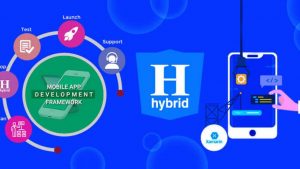Hybrid mobile apps are becoming more and more popular these days. Combining elements of both native and web apps, hybrid apps provide the benefits of fast development using web technologies along with access to native features like camera, GPS etc. This makes them a great choice for developers looking to build cross-platform apps efficiently.
Here is a summary table of the key points from the blog post:
| Framework | Key Strengths | Limitations | Best For |
|---|---|---|---|
| React Native |
|
|
|
| Flutter |
|
|
|
| Ionic |
|
|
|
| Xamarin |
|
|
|
| NativeScript |
|
|
|
| Capacitor |
|
|
|

But which framework works best for building hybrid mobile apps? There are a few good options to consider for hybrid app development:

React Native
React Native is one of the most popular open-source frameworks for building native-like apps using React and JavaScript. It was created by Facebook and has a large community behind it.
Some key advantages of using React Native:
- Uses React concepts like JSX, components etc. Familiar for React developers.
- Hot reloading saves development time
- Lots of reusable UI components and libraries
- Good documentation and community support
- Apps feel native and have smooth UX
- Supported by Facebook and used in many production apps
The biggest limitation of React Native is that it still requires platform-specific code for accessing all native features. Building truly custom UIs is also not easy.
Overall, React Native is a great choice for developers who know React or JavaScript and want to build high quality hybrid apps quickly. The vast ecosystem makes development easier.
Flutter
Flutter is a newer open-source SDK by Google for building hybrid mobile apps. It uses the Dart language and Flutter widgets for building app UI.
Some of the key highlights of Flutter:
- Uses a single codebase for both Android and iOS
- Beautiful ready-made widget library with customizability
- Excellent for building highly customized UIs
- Fast rendering and high performance
- Great documentation and growing community
Flutter’s limitations are that it requires learning a new language (Dart), and the ecosystem is still maturing. App size can also be large.
For developers not knowing React, Flutter is a great option to build customizable, high performance hybrid mobile apps with native-like experiences.
Ionic
Ionic is an open-source SDK focused on building hybrid mobile apps using web technologies like HTML, CSS and JavaScript. It provides UI components, tools and services for shipping high quality cross-platform apps.
Here are some key points about Ionic:
- Build apps with web tech like Angular, React or Vue
- Large library of mobile-optimized UI elements
- Supports PWAs, native styling, and access to device APIs
- Theming and pre-built app templates
- Enterprise support and detailed documentation
The drawback with Ionic is that apps still rely on WebViews, so very custom UIs and native-like performance is difficult. App size can also be large.
For web PHP developers looking to quickly build mobile apps using their existing skills, Ionic is a simple and easy to use option.
Xamarin
Xamarin is a .NET based framework owned by Microsoft for building native iOS, Android and Windows apps using C# and .NET codebase.
Some notable aspects:
- Single language – C# and .NET used for all platforms
- Good for teams with .NET skills
- Access native APIs and UI elements
- Microsoft backing and integration with Visual Studio
- Suitable for enterprise apps requiring security
Downsides are that Xamarin requires knowledge of C# and .NET ecosystem. Apps can also have large size.
For teams with strong .NET expertise, Xamarin can be an efficient way to build secure, native-quality apps from a single codebase.
NativeScript
NativeScript is an open-source framework for building truly native iOS and Android apps using JavaScript and CSS. It provides direct access to native APIs and components.
Key points about NativeScript:
- Build highly native UIs and experiences
- Lightning fast performance with native compilation
- Reuse skills in Angular, TypeScript and JavaScript
- Community support and detailed docs
- Plugins for device APIs, third-party SDKs etc.
The learning curve with NativeScript can be steep for web developers. Apps also require more code than hybrid solutions.
If native quality and performance is highest priority, NativeScript is a robust framework for leveraging web skills to build mobile apps.
Capacitor
Capacitor is a relatively new open-source framework that builds hybrid apps using web technologies and then deploys them natively. It provides a uniform API for accessing native features.
Important aspects:
- Write code in JavaScript, TypeScript or web framework
- Deploy as a PWA, Android, iOS and Electron app
- Native bridge for smooth UX and native APIs
- Lightweight with minimal overhead
- Maintained by Ionic team
Capacitor has a much smaller community currently. Not as feature rich as other frameworks yet.
For developers wanting to build PWAs, web apps and mobile apps from the same code, Capacitor provides a promising multi-platform solution.
Conclusion
There is no single best framework for every situation. Factors like app requirements, target platforms, development skills and timeline determines what works best.
React Native and Flutter provide the most mature cross-platform solutions. Ionic helps web developers leverage existing skills. Xamarin is good for C# teams wanting native-quality. NativeScript excels at uncompromised native UX. And Capacitor is interesting for uniform web/mobile development.
Do your research, evaluate options against your needs and choose the framework that best balances productivity, performance and long term app goals. The ecosystem is also key – pick a technology with sufficient support and an active community.
With the right framework choice, you can build amazing hybrid mobile apps efficiently.
FAQs
What is the main advantage of hybrid app frameworks?
Hybrid frameworks allow building cross-platform native-like apps from a single codebase efficiently using web skills like JavaScript, CSS etc. This saves time and effort compared to pure native development.
Are hybrid apps as good as native apps?
Generally no – native apps will provide better performance and more custom UIs optimized for the platform. But hybrid apps can still provide great user experiences for most use cases.
Can I build apps for App Store and Play Store using hybrid frameworks?
Yes, apps built with hybrid frameworks like React Native and Flutter can be deployed on both iOS and Android app stores. They use native shells to package web code into native apps.
Which framework has the biggest community?
Currently React Native likely has the largest community of developers and support resources. Flutter is growing quickly though.
Do I need to know native languages like Swift or Java to use hybrid frameworks?
No, most hybrid frameworks allow building apps using only web development skills like JavaScript, TypeScript, Dart etc. But basic native knowledge can be useful.
How fast is the development using hybrid vs native?
Development is typically much faster using hybrid frameworks compared to building native iOS and Android apps separately. Reusable cross-platform code speeds up the process.
Which framework is used by the most popular apps?
React Native is used by Skype, Tesla, Instagram, Walmart and many other top apps. Flutter is also gaining adoption in top apps like BMW.
Can I use web frameworks like Angular with hybrid mobile development?
Yes, many hybrid frameworks like Ionic and NativeScript allow using Angular, React, Vue and other web frameworks to build mobile apps.
What are the disadvantages of hybrid apps?
Limitations include performance compared to native, lack of fully customized native UI, larger app size and dependence on third-party tools. But the pros generally outweigh cons.
Disclosure: The articles, guides and reviews on BlowSEO covering topics like SEO, digital marketing, technology, business, finance, streaming sites, travel and more are created by experienced professionals, marketers, developers and finance experts. Our goal is to provide helpful, in-depth, and well-researched content to our readers. You can learn more about our writers and the process we follow to create quality content by visiting our About Us and Content Creation Methodology pages.

